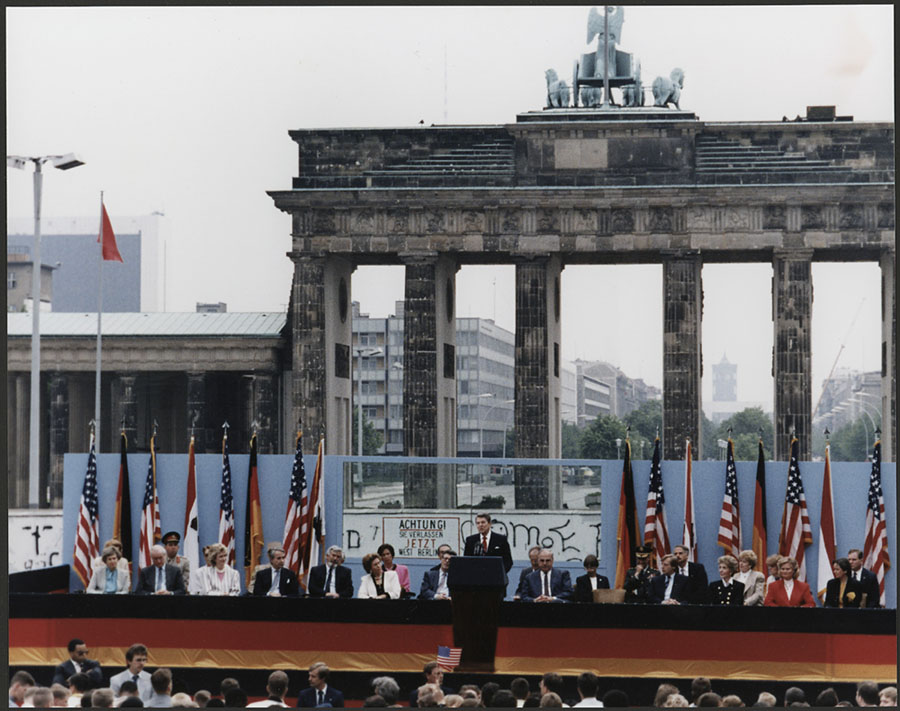Ronald Reagan, the 40th president of the United States, gave one of the most memorable speeches in modern history during his visit to Berlin on June 12, 1987. His speech at the Brandenburg Gate, in which he famously declared, “Mr. Gorbachev, tear down this wall,” challenged Soviet leader Mikhail Gorbachev to take down the Berlin Wall that had divided the city and its people for nearly three decades. This speech is still remembered today as a defining moment in the Cold War and a testament to Reagan’s leadership and vision.
At the time of Reagan’s speech, the Berlin Wall had been in place for 26 years, serving as a symbol of the division between East and West during the Cold War. The wall was erected in 1961 by the East German government to prevent citizens from escaping to the West. It was a physical manifestation of the Iron Curtain, which separated the Communist countries of Eastern Europe from the democratic nations of Western Europe.
In the early 1980s, Reagan began a campaign to increase pressure on the Soviet Union and hasten the end of the Cold War. He advocated for American military strength, economic growth, and political freedom, all of which he believed were necessary to win the ideological battle against the Soviet Union.
Reagan’s visit to Berlin in 1987 was highly anticipated, and his speech at the Brandenburg Gate was seen as an opportunity to make a strong statement about the United States’ commitment to freedom and democracy. In the weeks leading up to the speech, there was intense debate within the Reagan administration about whether or not he should use such provocative language. Some advisors argued that it would be seen as overly confrontational, while others believed that it was necessary to challenge the Soviet Union directly.
In the end, Reagan decided to include the now-famous line in his speech. Standing before a huge crowd of West Berliners, he declared, “We welcome change and openness; for we believe that freedom and security go together, that the advance of human liberty can only strengthen the cause of world peace… General Secretary Gorbachev, if you seek peace, if you seek prosperity for the Soviet Union and Eastern Europe, if you seek liberalization: Come here to this gate! Mr. Gorbachev, open this gate! Mr. Gorbachev, tear down this wall!”
Reagan’s speech was met with cheers and applause from the crowd, but it was not initially well-received by the Soviet government. They saw it as a direct challenge to their authority and an attempt to interfere in the internal affairs of East Germany. However, over time, the message of Reagan’s speech began to sink in.
The Berlin Wall did not come down immediately after Reagan’s speech, but it is widely seen as one of the events that led to its eventual dismantling in 1989. Reagan’s call for openness and freedom resonated with people throughout the Soviet bloc, and helped to galvanize opposition to Communist rule.
In retrospect, it is clear that Reagan’s speech was a turning point in the Cold War. It signaled a shift in American policy toward greater confrontation with the Soviet Union, and helped to set the stage for the eventual collapse of the Communist regimes in Eastern Europe.
However, Ronald Reagan’s “Mr. Gorbachev, tear down this wall” speech was more than just a political or diplomatic move. It was also a powerful symbol of hope and freedom for people around the world who were struggling against tyranny and oppression.
Through his words and actions, Reagan demonstrated that the United States was truly committed to the ideals of democracy and human rights. He showed that America was willing to take a stand for these values, even in the face of adversity and resistance.
